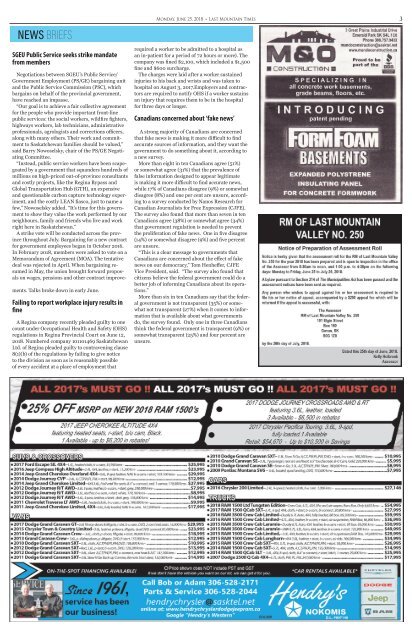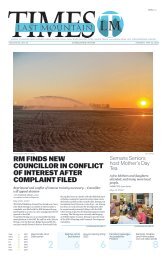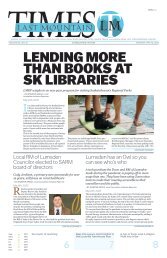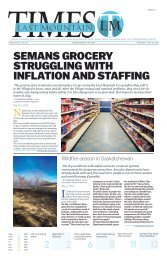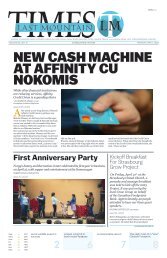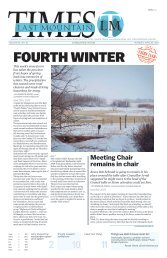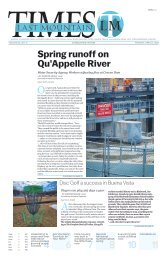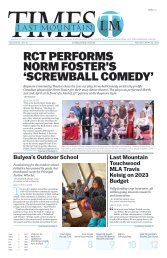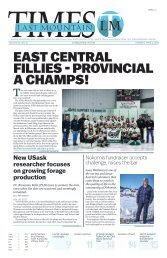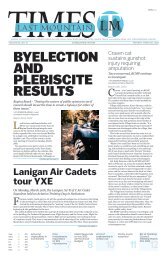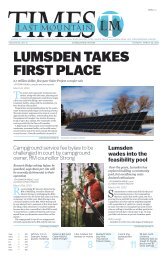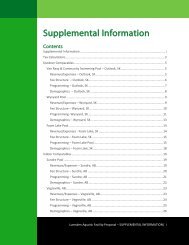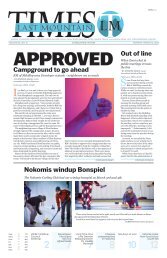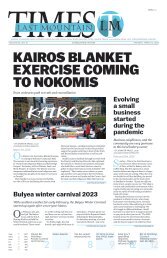LMT June 25 2018
Create successful ePaper yourself
Turn your PDF publications into a flip-book with our unique Google optimized e-Paper software.
NEWS BRIEFS<br />
SGEU Public Service seeks strike mandate<br />
from members<br />
Negotiations between SGEU’s Public Service/<br />
Government Employment (PS/GE) bargaining unit<br />
and the Public Service Commission (PSC), which<br />
bargains on behalf of the provincial government,<br />
have reached an impasse.<br />
“Our goal is to achieve a fair collective agreement<br />
for the people who provide important front-line<br />
public services: the social workers, wildfire fighters,<br />
highways workers, lab technicians, administrative<br />
professionals, agrologists and corrections officers,<br />
along with many others. Their work and commitment<br />
to Saskatchewan families should be valued,”<br />
said Barry Nowoselsky, chair of the PS/GE Negotiating<br />
Committee.<br />
“Instead, public service workers have been scapegoated<br />
by a government that squanders hundreds of<br />
millions on high-priced out-of-province consultants<br />
and costly projects, like the Regina Bypass and<br />
Global Transportation Hub (GTH), an expensive<br />
and questionable carbon capture technology experiment,<br />
and the costly LEAN fiasco, just to name a<br />
few,” Nowoselsky added. “It’s time for this government<br />
to show they value the work performed by our<br />
neighbours, family and friends who live and work<br />
right here in Saskatchewan.”<br />
A strike vote will be conducted across the province<br />
throughout July. Bargaining for a new contract<br />
for government employees began in October 2016.<br />
In February <strong>2018</strong>, members were asked to vote on a<br />
Memorandum of Agreement (MOA). The tentative<br />
deal was rejected in April. When bargaining resumed<br />
in May, the union brought forward proposals<br />
on wages, pensions and other contract improvements.<br />
Talks broke down in early <strong>June</strong>.<br />
Failing to report workplace injury results in<br />
fine<br />
A Regina company recently pleaded guilty to one<br />
count under Occupational Health and Safety (OHS)<br />
regulations in Regina Provincial Court on <strong>June</strong> 12,<br />
<strong>2018</strong>. Numbered company 101101469 Saskatchewan<br />
Ltd. of Regina pleaded guilty to contravening clause<br />
8(1)(b) of the regulations by failing to give notice<br />
to the division as soon as is reasonably possible<br />
of every accident at a place of employment that<br />
Monday, <strong>June</strong> <strong>25</strong>, <strong>2018</strong> • Last Mountain Times<br />
required a worker to be admitted to a hospital as<br />
an in-patient for a period of 72 hours or more). The<br />
company was fined $2,100, which included a $1,500<br />
fine and $600 surcharge.<br />
The charges were laid after a worker sustained<br />
injuries to his back and wrists and was taken to<br />
hospital on August 3, 2017.Employers and contractors<br />
are required to notify OHS if a worker sustains<br />
an injury that requires them to be in the hospital<br />
for three days or longer.<br />
Canadians concerned about ‘fake news’<br />
A strong majority of Canadians are concerned<br />
that fake news is making it more difficult to find<br />
accurate sources of information, and they want the<br />
government to do something about it, according to<br />
a new survey.<br />
More than eight in ten Canadians agree (51%)<br />
or somewhat agree (31%) that the prevalence of<br />
false information designed to appear legitimate<br />
is making it more difficult to find accurate news,<br />
while 17% of Canadians disagree (9%) or somewhat<br />
disagree (8%) and one per cent are unsure, according<br />
to a survey conducted by Nanos Research for<br />
Canadian Journalists for Free Expression (CJFE).<br />
The survey also found that more than seven in ten<br />
Canadians agree (38%) or somewhat agree (34%)<br />
that government regulation is needed to prevent<br />
the proliferation of fake news. One in five disagree<br />
(14%) or somewhat disagree (9%) and five percent<br />
are unsure.<br />
“This is a clear message to governments that<br />
Canadians are concerned about the effect of fake<br />
news on our democracy,” Tom Henheffer, CJFE<br />
Vice President, said. “The survey also found that<br />
citizens believe the federal government could do a<br />
better job of informing Canadians about its operations.”<br />
More than six in ten Canadians say that the federal<br />
government is not transparent (35%) or somewhat<br />
not transparent (27%) when it comes to information<br />
that is available about what governments<br />
do, the survey found. Only one in three Canadians<br />
think the federal government is transparent (9%) or<br />
somewhat transparent (<strong>25</strong>%) and four percent are<br />
unsure.<br />
3


